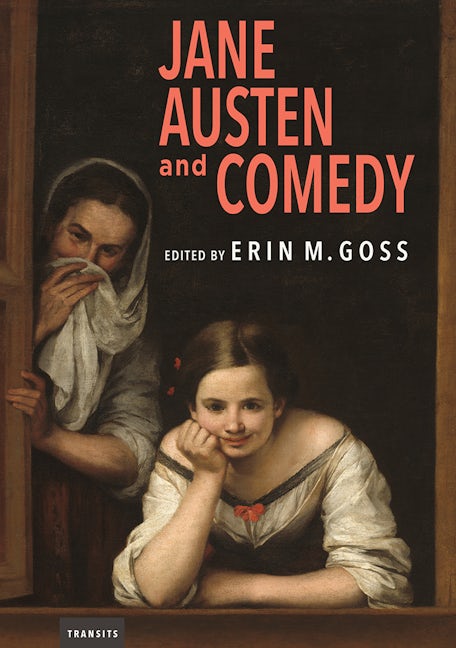December 16th marks the 245th anniversary of Jane Austen’s birth. In honor of this witty and astute writer, we’d like to share some of our favorite books that reconsider and elucidate her work.
Each of these Jane Austen books were published as part of our longstanding Transits: Literature, Thought & Culture, 1650-1850 series, which explores literary, artistic, cultural, and historical interconnections of the long eighteenth century.

Jane Austen and Comedy
Edited by Erin M. Goss
Jane Austen and Comedy takes for granted two related notions. First, Jane Austen’s books are funny; they induce laughter, and that laughter is worth attending to for a variety of reasons. Second, Jane Austen’s books are comedies, understandable both through the generic form that ends in marriage after the potential hilarity of romantic adversity and through a more general promise of wish fulfillment. In bringing together Austen and comedy, which are both often dismissed as superfluous or irrelevant to a contemporary world, this collection of essays directs attention to the ways we laugh, the ways that Austen may make us do so, and the ways that our laughter is conditioned by the form in which Austen writes: comedy. Jane Austen and Comedy invites reflection not only on her inclusion of laughter and humor, the comic, jokes, wit, and all the other topics that can so readily be grouped under the broad umbrella that is comedy, but also on the idea or form of comedy itself, and on the way that this form may govern our thinking about many things outside the realm of Austen’s work.
“An impressive compilation of erudite, thoughtful and thought-provoking essays, Jane Austen and Comedy is a seminal work of extraordinary scholarship — and one that is unreservedly recommended for community and academic library literary collections in general, and Jane Austen supplemental curriculum studies lists in particular.”
—Midwest Book Review

Jane Austen and Masculinity
Edited by Michael Kramp
Jane Austen and Masculinity is an eclectic collection of contemporary scholarship addressing the representation of men and masculinity in the fiction and popular adaptations of Austen. This anthology includes work by a variety of esteemed and emergent Austen scholars from around the world who engage in a dialogue on critical questions surrounding her fictional treatment of men and masculinity, such as historical (post-French Revolutionary) changes in social expectations for men and women, brothers and fathers, male lovers, soldiers and the military, queer and alternative sexualities, violence, and male devotees of Austen. The collection addresses Austen’s fiction, including her juvenilia, as well as the ongoing popular appeal of her work and the enduring Austen vogue. The work in this anthology builds on established critical discourses in Austen scholarship as well as important conversations in Masculinity Studies.
“The essays brought together here provide a suitably kaleidoscopic view of maleness, both in Austen’s own works and in the reformulations and extensions of those works critically, cinematically, and fictionally. . . . As a whole. . . this book provides thoughtful variety in its views of men and masculinity associated with Austen’s novels, all the richer for its broader considerations of contexts and aftereffects of Austen’s men.”
—Eighteenth Century Intelligencer

Satire, Celebrity, and Politics in Jane Austen
By Jocelyn Harris
In Satire, Celebrity, and Politics in Jane Austen, Jocelyn Harris argues that Jane Austen was a satirist, a celebrity-watcher, and a keen political observer. In Mansfield Park, she appears to base Fanny Price on Fanny Burney, criticize the royal heir as unfit to rule, and expose Susan Burney’s cruel husband through Mr. Price. In Northanger Abbey, she satirizes the young Prince of Wales as the vulgar John Thorpe; in Persuasion, she attacks both the regent’s failure to retrench, and his dangerous desire to become another Sun King. For Elizabeth Bennet in Pride and Prejudice, Austen may draw on the actress Dorothy Jordan, mistress of the pro-slavery Duke of Clarence, while her West Indian heiress in Sanditon may allude to Sara Baartman, who was exhibited in Paris and London as “The Hottentot Venus,” and adopted as a test case by the abolitionists. Thoroughly researched and elegantly written, this new book by Jocelyn Harris contributes significantly to the growing literature about Austen’s worldiness by presenting a highly particularized web of facts, people, texts, and issues vital to her historical moment.
“Satire, Celebrity and Politics is unfailingly fascinating in its dissection of Jane Austen, the satirist, and the text is enhanced by a well-chosen selection of contemporary portraits and gloriously scurrilous cartoons. The “stories behind the stories” always make for an interesting read and Harris has produced a book that will be read with great pleasure by academics and devoted readers alike.”
—Jane Austen’s Regency World
If you would like to discuss whether your work-in-progress might be right for Bucknell University Press or our Transits: Literature, Thought & Culture, 1650-1850 series, contact seg016@bucknell.edu or see our submission guidelines for more information.